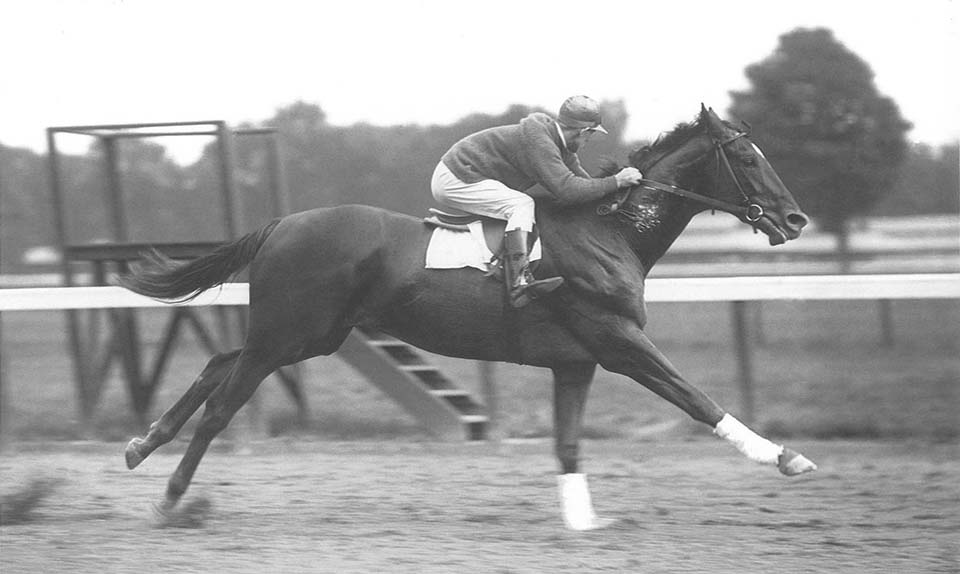Preakness Stakes Pari-mutuel Wagering
In 144 editions of the Preakness Stakes (it run in two divisions in 1918), 73 winners have left the post as betting choices. Since 1911, when pari-mutuel wagering made its debut at Pimlico, 28 Preakness favorites have started at odds of less than even-money and eighteen have won. Ten paid ¢.50-1 or less — Citation, 1948 (¢.10-1); Spectacular Bid, 1979 (¢.10-1); Count Fleet, 1943 (¢.15-1); Big Brown, 2008 (¢.20-1); Native Dancer, 1953 (.20-1); Secretariat, 1973 (¢.30-1); Nashua, 1955 (¢.30-1); War Admiral, 1937 (¢.35-1); Seattle Slew, 1977 (¢.40-1); Justify, 2018 (¢.40-1); Affirmed, 1978 (¢.50-1); and California Chrome, 2014 (¢.50-1).
RELATED: Preakness Stakes 2020 Odds: Robby Albarado Seeks Elusive Spotlight With Swiss Skydiver
Preakness Stakes Handicapping
In 1975 earned his spot as the longest-priced Preakness winner when he returned $48.80. No horse has paid more in the year since. In 1925, Coventry left the gate at 21-1 and was worth $45.60. Display paid $40.70 at odds of 19-1 in 1926 while Bee Bee Bee in 1972 rewarded his backers with a $39.40 return at 18-1. Other longshots include: Oxbow, 2013 (15-1, $32.80)
Hindus, 1900 (15-1 $32)
Don Enrique, 1907 (15-1, $32)
Deputed Testamony, 1983 (14-1 $31)
Cloud Computing, 2017 (13-1, $28.80)
Bernardini, 2006 (12-1, $27.80)
Shackleford, 2011 (12-1, $27.20)
The Bart, 1886 (12-1 $26.40)
A total of 16 of the last 23 Preakness Stakes winners have been named champion 3-year-old male at the annual Eclipse Awards, the most recent being Triple Crown winner Justify in 2018. The 13 other most recent Preakness Stakes winners to be named 3-year-old champion are: Real Quiet (1998); Charismatic (1999); Point Given (2001); War Emblem (2002); Funny Cide (2003); Smarty Jones (2004); Afleet Alex (2005); Bernardini (2006); Curlin (2007); Big Brown (2008); Lookin At Lucky (2010); I’ll Have Another (2012); California Chrome (2014); and American Pharoah (2015. Neither Preakness winner Oxbow (2013) nor Cloud Computing (2017) were included in the three finalists for the division’s Eclipse Award the year they won. The filly Rachel Alexandra (2009), who became the first filly since Nellie Morse (1924) to win the Preakness Stakes, was named both Horse of the Year and champion 3-year-old filly honors in the year she won the Preakness. She also defeated the boys when she won that year’s Haskell Invitational (G1) and Woodward Stakes (G1). She was 18th Preakness winner to earn Horse of the Year.
RELATED: Black-Eyed Susan On Preakness Stakes 2020 Day Features 11-Horse Field
Preakness Stakes Best Bet
From 1936-1970 American champions were named by the Thoroughbred Racing Associations (TRA) and The Daily Racing Form (DRF). In 1971 The Daily Racing Form, the National Turf Writers’ Association (NTWA)and the Thoroughbred Racing Associations formed the Eclipse Awards. No champions were named prior to 1936.)
1937 War Admiral
1939 Challedon
1940 Bimelech
1941 Whirlaway
1942 Alsab
1943 Count Fleet
1946 Assault
1948 Citation
1949 Capot
1950 Hill Prince
1953 Native Dancer
1955 Nashua
1957 Bold Ruler
1958 Tim Tam
1961 Carry Back
1964 Northern Dancer
1965 Tom Rolfe
1967 Damascus
1970 Personality
1971 Canonero II
1973 Secretariat
1974 Little Current
1977 Seattle Slew
1978 Affirmed
1979 Spectacular Bid
1981 Pleasant Colony
1986 Snow Chief
1987 Alysheba
1988 Risen Star
1989 Sunday Silence
1991 Hansel
1993 Prairie Bayou
1997 Silver Charm
1998 Real Quiet
1999 Charismatic
2001 Point Given
2002 War Emblem
2003 Funny Cide
2004 Smarty Jones
2005 Afleet Alex
2006 Bernardini
2007 Curlin
2008 Big Brown
2010 Lookin at Lucky
2012 I’ll Have Another
2014 California Chrome
2015 American Pharoah
2018 Justify *
Miriam Lee has always been a horse racing fan thanks to trips to the tracks in her home state of Maryland with her father as kid. She owns an OTTB and is an advocate for promoting the sport among her peers. Miriam studies communication arts at Hood College and will receive her master’s degree in 2021, which she plans to use for a career in screenwriting. Her all-time favorite racehorse is Man O War.





